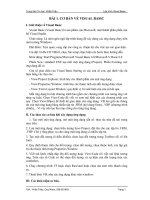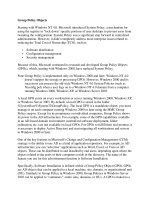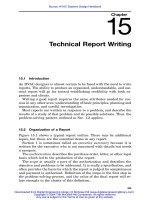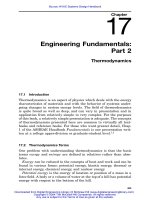Tài liệu List Of PLI Routines part 1 pptx
Bạn đang xem bản rút gọn của tài liệu. Xem và tải ngay bản đầy đủ của tài liệu tại đây (48.15 KB, 8 trang )
[ Team LiB ]
B.1 Conventions
Conventions to be used for arguments are shown below.
Convention Meaning
char *format Pass formatted string
char * Pass name of object as a string
underlined arguments Arguments are optional
* Pointer to the data type
......... More arguments of the same type
[ Team LiB ]
[ Team LiB ]
B.3 Utility (tf_) Routines
Utility (tf_) routines are used to pass data in both directions across the Verilog/user C
routine boundary. All the tf_ routines assume that operations are being performed on
current instances. Each tf_ routine has a tf_i counterpart in which the instance pointer
where the operations take place has to be passed as an additional argument at the end of
the argument list. See Table B-7
through B-16.
B.3.1 Get Calling Task/Function Information
Table B-7. Get Calling Task/Function Information
Return
Type Name
Argument
List Description
char * tf_getinstance ( ); Get the pointer to the current instance of the
simulation task or function that called the user's
PLI application program.
char * tf_mipname ( ); Get the Verilog hierarchical path name of the
simulation module containing the call to the
user's PI application program.
char * tf_ispname ( ) Get the Verilog hierarchical path name of the
scope containing the call to the user's PLI
application program.
B.3.2 Get Argument List Information
Table B-8. Get Argument List Information
Return
Type
Name Argument List Description
int tf_nump ( ); Get the number of parameters
in the argument list.
int tf_typep (int param_index#); Get the type of a particular
parameter in the argument
list.
int tf_sizep (int param_index#); Get the length of a parameter
in bits.
t_tfexprinfo
*
tf_expinfo (int param_index#, struct
t_tfexprinfo *exprinfo_p);
Get information about a
parameter expression.
t_tfexprinfo
*
tf_nodeinfo (int param_index#, struct
t_tfexprinfo *exprinfo_p);
Get information about a node
value parameter.
B.3.3 Get Parameter Values
Table B-9. Get Parameter Values
Return
Type Name Argument List Description
int tf_getp (int param_index#); Get the value of parameter in
integer form.
double tf_getrealp (int param_index#); Get the value of a parameter in
double-precision floating-point
form.
int tf_getlongp (int *aof_highvalue, int
para_index#);
Get parameter value in long 64-
bit integer form.
char * tf_strgetp (int param_index#, char
format_character);
Get parameter value as a
formatted character string.
char * tf_getcstringp (int param_index#); Get parameter value as a C
character string.
void tf_evaluatep (int param_index#); Evaluate a parameter expression
and get the result.
B.3.4 Put Parameter Value
Table B-10. Put Parameter Values
Return
Type Name Argument List Description
void tf_putp (int param_index#, int
value);
Pass back an integer value to
the calling task or function.
void tf_putrealp (int param_index#, double
value;
Pass back a double-precision
floating-point value to the
calling task or function.
void tf_putlongp (int param_index#, int
lowvalue, int highvalue);
Pass back a double-precision
64-bit integer value to the
calling task or function.
void tf_propagatep (int param_index#); Propagate a node parameter
value.
int tf_strdelputp (int param_index#, int
bitlength, char format_char,
int delay, int delaytype,
char *value_p);
Pass back a value and
schedule an event on the
parameter. The value is
expressed as a formatted
character string, and the
delay, as an integer value.
int tf_strrealdelputp (int param_index#, int
bitlength, char format_char,
int delay, double delaytype,
char *value_p);
Pass back a string value with
an attached real delay.
int tf_strlongdelputp (int param_index#, int
bitlength, char format_char,
int lowdelay,int highdelay,
int delaytype, char
*value_p);
Pass back a string value with
an attached long delay.
B.3.5 Monitor Parameter Value Changes
Table B-11. Monitor Parameter Value Changes
Return
Type Name Argument List Description
void tf_asynchon ( ); Enable a user PLI routine to be called
whenever a parameter changes value.
void tf_asynchoff ( ); Disable asynchronous calling.
void tf_synchronize ( ); Synchronize parameter value changes to
the end of the current simulation time
slot.
void tf_rosynchronize ( ); Synchronize parameter value changes
and suppress new event generation
during current simulation time slot.
int tf_getpchange (int
param_index#);
Get the number of the parameter that
changed value.
int tf_copypvc_flag (int
param_index#);
Copy a parameter value change flag.
int tf_movepvc_flag (int
param_index#);
Save a parameter value change flag.
int tf_testpvc_flag (int
param_index#);
Test a parameter value change flag.
B.3.6 Synchronize Tasks
Table B-12. Synchronize Tasks
Return
Type Name Argument List Description
int tf_gettime ( ); Get current simulation time
in integer form.
tf_getrealtime
int tf_getlongtime (int *aof_hightime); Get current simulation time
in long integer form.
char * tf_strgettime ( ); Get current simulation time
as a character string.
int tf_getnextlongtime (int *aof_lowtime, int
*aof_hightime);
Get time of the next
scheduled simulation
event.
int tf_setdelay (int delay); Cause user task to be
reactivated at a future
simulation time expressed
as an integer value delay.
int tf_setlongdelay (int lowdelay, int
highdelay);
Cause user task to be
reactivated after a long
integer value delay.
int tf_setrealdelay (double delay, char
*instance);
Activate the misctf
application at a particular
simulation time.
void tf_scale_longdelay (char *instance, int
lowdelay, int hidelay, int
*aof_lowtime, int
*aof_hightime );
Convert a 64-bit integer
delay to internal simulation
time units.
void tf_scale_realdelay (char *instance, double
delay, double
*aof_realdelay);
Convert a double-precision
floating-point delay to
internal simulation time
units.
void tf_unscale_longdelay (char *instance, int
lowdelay, int hidelay, int
*aof_lowtime, int
*aof_hightime );
Convert a delay from
internal simulation time
units to the time scale of a
particular module.
void tf_unscale_realdelay (char *instance, double
delay, double
*aof_realdelay);
Convert a delay from
internal simulation time
units to the time scale of a
particular module.
void tf_clearalldelays ( ); Clear all reactivation
delays.
int tf_strdelputp (int param_index#, int
bitlength, char
format_char, int delay, int
delaytype, char *value_p);
Pass back a value and
schedule an event on the
parameter. The value is
expressed as a formatted
character string and the
delay as an integer value.
int tf_strrealdelputp (int param_index#, int
bitlength, char
Pass back a string value
with an attached real delay.









